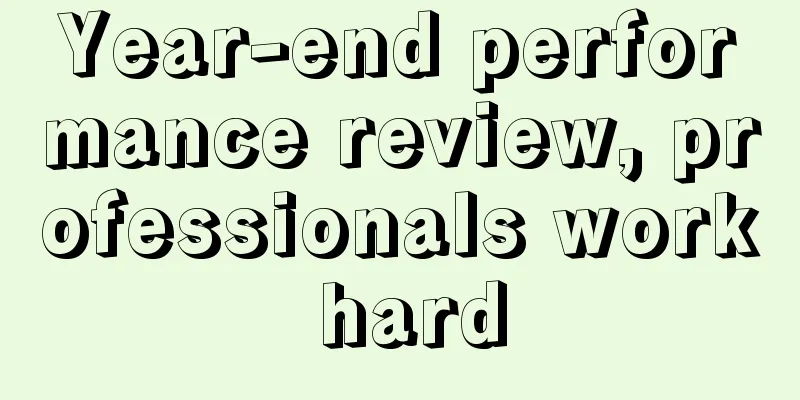Year-end performance review, professionals work hard

December is here. People in the workplace have to make year-end performance reports again. In the eyes of many people, year-end performance reports are no different from students' final exams, or even more terrible than final exams. Their reason is that they can still fail the exams, and at most they will be scolded by their parents. Before the exam, they can also cram for vocabulary and try to pass the passing line. Year-end performance reports are different. They may be related to the actual interests of people in the workplace, including the amount of year-end bonuses, whether they can be promoted, and their image in the eyes of leaders. These are the "food" for people in the workplace, and they cannot fail. So, the intense "exam preparation" began. Shenran talked to several professionals. They came from different industries and the forms of their year-end performance reports were also different. They were divided into two camps on the positioning of the year-end performance report. One camp believed that the year-end performance report was to better quantify their own work and to achieve effective communication with leaders and colleagues through this rare opportunity. The other camp believed that the year-end performance report was to a certain extent done for the leaders to see. Some people would rush to complete a project in Q4 in order to "beautify" the year-end performance report. Some people even felt that the year-end performance report was meaningless and should not exist. It is often said that doing a good job is useless, and those who are good at speaking in front of the leaders have the upper hand. The year-end performance review is a competition of who speaks beautifully, rather than how well they have done. Several interviewees look forward to the performance review, which is a good opportunity to communicate with leaders and colleagues. The other party can hear your explanation, and you can also convey information to the other party and put forward your needs. This should be a channel for efficient dialogue, not a Shura field for self-boasting. The year-end performance review is also a job, and it deserves to be taken seriously as a normal job. However, taking off the cloak of formalism, what is the value of the year-end performance review, and how to make better use of this dialogue opportunity may require joint thinking between superiors and subordinates. 1. Ask your supervisor to help you revise the PPT and practice your speech before reporting.Lisa | 24 years old, a traditional industry practitioner in Wuhan I joined my current company in September this year. My last job was in a foreign-funded enterprise, which was not very large. The working atmosphere was relatively free and the year-end summary was also very relaxed. When I came to my current company, I still felt a little uncomfortable with the corporate culture. When I heard that the year-end summary had to be done in a PPT and the top leader of the department was coming to attend the meeting, I was so anxious that I wanted to quit on the spot. Another reason is that I have only been working for three months and have not made any outstanding achievements. The projects I am responsible for have also been hit by the epidemic, and the overall performance is lackluster. After our team finished the PPT, we had to show it to our direct supervisor for review. My first version was sent back for redo. At that time, my direct supervisor said to me: "You keep talking about what you have learned from your work. Is the company paying you to learn?" The words are rough but the truth is true. Another colleague who looked at my PPT also said that he didn't understand what I had done for three months. Later, my direct supervisor personally came to revise my report, telling me that I should clearly explain the achievements, difficulties and key points, and never cover everything . The most important thing is that the performance report is a dialogue with the leader, not talking to myself or moving myself. I must consider from the perspective of the leader, what he wants to hear, not how I want to analyze myself. After the PPT was finalized, I started to practice intermittently. My direct supervisor worked harder than me. He worked a lot, but during the days when he was preparing for the performance report, he might have spent 30% of his time on this. He also emphasized to us that the company attaches great importance to the year-end performance report, and it will be related to promotion, year-end bonus, etc. He repeatedly reminded us to be alert and pay attention to it. I didn't think about the promotion, I just felt that if I did a good job in the year-end performance report, I would leave a good impression on the supervisor, and at least I could relax for the next month and work without so much pressure. Before the report, when I went out to eat with my friends, I asked her to pretend to be my boss and I would read the speech to her . I also practiced repeatedly in the shower until I knew the speech by heart and never got stuck during the report. In the case of a short working time and no outstanding achievements, my job report skill is to form a closed loop for each work I bring up. What is the difficulty, how I tried to solve it, what experience I gained even though I did not successfully solve it, and what work I used this experience in. This is a closed loop. Some colleagues were particularly enthusiastic and even posted a screenshot of a chat with a client at 11pm, with the time marked in red. Of course, some people did not speak very well, and in the end, the department leader made a summary speech, and it seemed that he was not very satisfied overall. At first, I was very disdainful of this form of performance review. I am the kind of person who only wants to do my job well and doesn't care what the leader thinks of me. But now that the performance review is over, I can slowly understand and know the importance of this kind of performance review . Nowadays, the scale of the company is relatively large, and it is usually difficult to have the opportunity to communicate with the department leader, and it is also difficult to put forward your own needs and ideas. He also doesn't know how much work we have done, so this is an opportunity for two-way communication, especially in large companies with complex structures. However, I still think that it is not advisable to wait for the performance report to package yourself without working hard at ordinary times. Taking the performance report seriously should be like taking every job seriously. 2. Year-end self-evaluation: "Don't show your hard work, show your achievements"Luo Ji | 29-year-old Hangzhou Marketing Specialist At the beginning of December, the company assigned the year-end self-evaluation. Several days have passed, but I still haven't picked up the pen and don't know how to write it. I have been working for five or six years after graduation, and this is the first time I have to write an annual self-evaluation. This has a big impact on us. For me, it is directly linked to the year-end bonus. If I don’t write it well, I will inevitably get the worst performance rating of 3.25, which may also affect my future promotion. The leaders also attach great importance to it and ask us to write it well and make it more beautiful. The leaders also write their own content based on our year-end self-evaluation, and our departments will also score each other, and finally show it to the boss, and then give a comprehensive evaluation of the department. In other words, our year-end summary is linked to the year-end performance of the entire department. The company stipulates that 80% of the content must be about business and 20% about personal growth and values . There is no need to make a PPT. We have a unified template and can be written in Excel. After it is written and submitted, it will enter the formal scoring stage. I had planned to finish the first draft in the next two days, but I didn't finish it because I felt that it was difficult for me to grasp the narrative style and failed to show the value of my contribution. I don't usually keep any records. Unlike operations, where data is easy to quantify, our profession is more like logistics. We have to try to link it with daily business and write down what value it has brought to the business. My experience is that the year-end self-evaluation should not show hard work, but achievements. Some data needs to be beautified so that the leader can understand what I have done in a more concrete way and make the value of the contribution more intuitive. I can understand writing a year-end self-evaluation. It allows employees to review their work for the past year and summarize the past so that they can better face the future. It just takes some time to sort it out, which is a bit troublesome. Before there were no year-end performance reports, promotion and year-end bonus depended on the mood of the leader. With the year-end performance report, it is relatively transparent. I also want to sort myself out and show my strengths in this process. Whether the year-end self-evaluation is a formality actually depends on the atmosphere of the company itself . In the startup company where I work now, everyone is very enthusiastic and focused on their own work. Doing the year-end self-evaluation is not a formality, but it allows the boss to clearly know what each department is busy with and make some adjustments to future business, which is also helpful. 3. After my boss questioned my work results, I urgently added a project to "beautify" my year-end performance reportZhang Ning | 39 years old, Beijing Brand Director After I resigned at the end of last year, I joined this relatively traditional company, mainly responsible for branding. I have been in the workplace for so many years and have done many year-end performance reviews, but this year's year-end performance review still has a certain amount of pressure. Around October, I was talking to my boss, and he asked me, "Why haven't I seen any results recently?" I said, "Look at the performance in the fourth quarter." It was not a formal work report at the time, but just a casual conversation after an accidental encounter. However, my alarm bells immediately went off, and I felt that the boss's recognition and perception of our department's work was not very high. When I joined the company, my boss asked the brand department to convey to the market our company's low-key yet powerful brand image. In the past year, after I joined the company, I built up the brand team and self-media matrix from scratch. Everything was just starting, and I encountered numerous obstacles in the process. The company was established nearly 8 years ago, but it has never had much presence in the public eye. The boss has no idea how to build a brand. I want exposure, but every time I find some exposure resources, I get rejected for various reasons. After this year, it feels like the company wants exposure, but is also afraid of it. Moreover, affected by the external environment, the company has been calling for cost reduction and efficiency improvement over the past year, and there is not enough budget for our department. Other departments in the company only regard us as a department that spends money, and communication and cooperation between departments are difficult to promote. In theory, our year-end performance report is not linked to performance KPIs, and it will not affect the year-end bonus. Although there is a performance appraisal form every month, in which the daily performance accounts for 20%, in reality, the performance KPI appraisal set by the company is difficult to implement, and the performance appraisal form can basically be said to be in name only. After that conversation with my boss, I began to think about the awkward situation I might encounter when reporting my work at the end of the year. The bosses of other departments in the company, such as the business department and the marketing department, had relatively clear work results and data to present, but my work results were difficult to quantify, and many of my ideas were also abandoned halfway. I was also worried that the company had been calling for cost reduction, and if I didn’t produce anything by the end of the year, I might be laid off. So I wanted to highlight my work results by doing a project that could be seen with the naked eye, and finally decided to build a publicly visible platform, which would not only showcase the company’s image, but also attract business for the company. In the past two months, I have been pushing forward various processes to promote the implementation of this project. Now it has entered the middle and late stages of the project, and it can be completed and launched before the end of the month. The meeting time for the year-end performance review has not been finalized yet, and I have been working overtime to prepare the PPT recently. However, with this project in progress, my year-end performance review PPT has some highlights, and I will be more confident when discussing next year's plans. Fourth, the annual performance review of the whole company is a formality, and the atmosphere is depressing, like a defenseLeilei | 29 years old, Internet industry in Guangdong I have been working for more than five years and have experienced annual performance reviews for four years, which are basically done at the end of every year. Our requirement is that employees should conduct self-analysis, self-planning, and self-profiling based on their own job content, and speak at the general meeting. Each person’s speech should be within 10 minutes. At the same time, all employees will be scored, and the scores will account for a certain proportion of the performance appraisal. This format does allow us to review the work of the year, but what I find unreasonable is that every time everyone has to report on their work, there are 40 or 50 people in the company, and even if each person only spends ten minutes, it takes a whole day to listen to others' reports. In fact, no one really listens to others' work, and many people think it is a waste of time . The style of reporting also makes me feel suffocated. At that time, all leaders and colleagues will be there, and the person reporting on their work will have to answer everyone's questions and get scores one by one, just like doing a graduation thesis defense. Other colleagues have similar feelings, and they all feel that reporting is a bit painful, but they have to do it. Most of them are still very "prepared" when doing the year-end report, saying that they have not prepared much, but in the end they talk a lot during the report and prepare a very beautiful report. At the end of every year, I have to spend three or four days on the annual performance review and make a decent performance report. However, I am a lazy person and I write according to a template every year and complete it in a standard way. In last year's performance review, I have forgotten what I said specifically. Leaders do attach great importance to the year-end performance review, but I’m not quite sure what kind of report they like. After all, the scores will not be made public. If it is a job report within the same business department, I think it is still useful and we can learn from each other, but the job report summary of all employees is a formality . Work cannot be explained in a few words , and many people are not interested in the content of other people's work. The job report of all employees is a waste of time. 5. It took three days to analyze the full year's data, and every sentence had to be "watertight"Aya | 27 years old, Dalian training industry We have to do an annual performance review every year. Senior management will speak, and others don’t need to give speeches, but they have to submit PPTs in advance. Leaders will analyze and ask questions based on the content of the report. I am now in the middle management level, and my task is to report the department's annual data to the upper level. The content must be very detailed, because we are in the training industry, and the usual operating projects, teaching conditions, class occupancy rates, etc. must be detailed. During the epidemic, we will also have online activities, which must be distinguished from offline statistics. In short, from the perspective of major items, there are many and diverse aspects of job reporting. From the perspective of the content of each major item, it must be clear what the task is, how much has been completed, why it has not been completed, etc. In short, anything that can be presented in data at work must be digitized. Working with data is somewhat alien to the nature of my job. In the past, everyone thought that training was just about giving lectures, and analyzing data was someone else's job. Indeed, when I was still working on the front line, I also felt that changes in data had nothing to do with me, and I just had to manage my courses. The year-end performance review of front-line employees did not require data analysis, but only required them to talk about what they had done and look forward to the future. At that time, I still felt the pressure of having to write a short essay. Now that I am in a different position, I am not opposed to data. Instead, I am used to this quantitative work method. In fact, we do a small summary every month, and it is precisely because of these monthly data that I don’t get too crazy when I report my work at the end of the year. Moreover, every year I will review the data at the end of last year and do a more comprehensive analysis, mainly to make myself more confident. However, analyzing data is still very time-consuming, and I started to feel a little anxious when December came. I basically had to start preparing three days in advance, and do a little every night when I got home from get off work. The intervals could not be too long, because I needed to ensure that my thoughts were complete. We have a unified PPT template, and you just need to put your own analysis in it, but this is also an art that can directly reflect your thinking logic and aesthetic level. How to make this data more intuitive is often where I spend the most time. On the day of the centralized report, although the middle-level and lower-level employees do not have to speak, they must answer questions from the leaders. For example, if I mentioned in my performance report that a certain class was not effective enough, and I designed a special solution, the leader would ask me how long it would take to complete this solution, how many people would be responsible for it, when it would be completed, etc. Therefore, the biggest difference between the performance reports of the middle-level employees and those of the front-line employees is that every word of the middle-level employees cannot be spoken carelessly, but must be well-reasoned and watertight. From my experience, if you are a middle-level manager, you must have the habit of summarizing. When I do the year-end report, I look through the data of a certain month and find that there was a problem at work at that time. I solved it in time, and this positive cycle will continue in the next month. This point can be extracted and put in the year-end report. Author: Zou Shuai, Li Qiuhan, Wang Min Source: WeChat public account "Shenran (ID: shenrancaijing)" |
<<: [Summary] 15 common problems in private domain operations
>>: Double 12 e-commerce promotion is quiet
Recommend
If you understand the money-making logic of advertising, you can make money!
This article introduces how to find money-making o...
Updates to Shopee's non-compliance penalty policy and order incomplete rate policy
In order to further regulate the sellers’ delivery...
Which country is jumia from? What are the steps for refunding?
Although there are many cross-border e-commerce pl...
Can new offline consumption scenarios be opened up through pet social networking?
The pet market is growing in size, and pets are me...
Can Korean cross-border e-commerce sell tea? What are the Korean cross-border e-commerce platforms?
With the development of global trade, cross-border...
Who will become the "second Lei Jun"? Let's talk about the six major schools of bosses who become Internet celebrities
Now many CEOs of companies have begun to shape the...
Design Meditations | Using logic-driven design to create sustainable industrial growth
Today, I will start with the project and deeply an...
When large companies start to "compete" for college students, do they rely on training or just letting them grow?
This article focuses on the peak of autumn recruit...
How can I leave a review on Amazon without getting rejected? How long does it take for the review to be displayed?
There are many rules on Amazon's cross-border ...
What sites does Amazon have? How does it charge?
Friends who know about e-commerce know that if you...
How to ship goods through Amazon FBM? What should I pay attention to?
In fact, no matter how strong the sellers are, the...
Luckin Coffee uses Maotai flavored milk to ensure that you can drink authentic Maotai
1 Yesterday I wrote about Luckin Coffee’s Moutai C...
What does a new Shopee store need to do? What are the basic tasks of a new store?
The development of the Shopee platform is very goo...
What are the requirements for Amazon main image videos? What are the rules?
Amazon has entered the era of video marketing. Ove...
How can individual merchants start trading on Xiaohongshu at low cost? Attached is a low-cost strategy example
How can a business start an account on Xiaohongshu...









